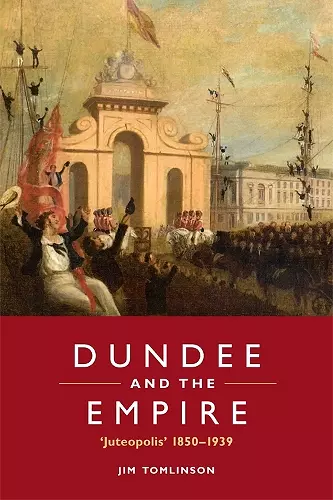Dundee and the Empire
‘Juteopolis’ 1850-1939
Format:Hardback
Publisher:Edinburgh University Press
Published:16th Jun '14
Currently unavailable, and unfortunately no date known when it will be back
This hardback is available in another edition too:
- Paperback£19.99(9781399563512)

In the half century before the First World War Britain simultaneously expanded its empire and globalized its economy. This book uses the case of Dundee to analyse the impact of these issues of empire and globalization, covering the ‘expansionary’ period before 1914 and the much more difficult era from the First to the Second War. Dundee is especially well-suited for this purpose given both the strength of its imperial connections (especially with India) and the intensity of its globalization. How did the people of Dundee respond to the challenges of being arguably the most economically globalized city in the world? The answer is complicated by the fact that the aspect of globalization which impacted most directly on the ordinary inhabitants of the city was competition in the jute industry from Calcutta—a city within the British Empire. So Dundee had to cope not only with powerful low-wage competition in jute, its staple industry, but the political reality that for decision-makers in London the fate of the British Empire in India was far more important than the economic well-being of a small Scottish city. This history of Dundee’s responses to these challenges combines global economic history with analysis of imperial relations, and examines how these issues were understood by ordinary Dundonians as well as politicians and policy-makers.
Tomlinson brings his enormous scholarship to bear on the problems faced by Dundee and points to a clear failure of political leadership, both at local and national levels, to build a consensus as to how best to respond to the challenges of globalisation in which a high-wage economy competes with a low-wage economy. This is the very problem experienced today by modernised western economies faced with competition from low-waged countries such as China. Thus Dundee’s experience is instructive and interesting in the light that it throws on such issues.' -- W. W. J. Knox, University of St Andrews * English Historical Review, vol 130, no 545 *
Tomlinson employs rich archival materials, particularly those of the Dundee Chamber of Commerce, the minutes of the local union of jute and flax workers (the DDUJFW), and the Dundee Year Book, along with contemporary newspaper coverage of events, in order to gauge public opinion of the industry and to measure how jute production impacted and was impacted by the city’s links to London and to the empire…Tomlinson also raises some excellent ideas about the complex relationships between class, gender, and imperialism, as they were borne out in Juteopolis and possibly how they can be extrapolated from there. In doing so he reveals how the local intersected with the national and the imperial levels in driving, or attempting to manipulate, British responses to changing circumstances, and how this impacted the everyday lives of Britons…a concise and detailed analysis of how one city’s fortunes rose and fell with those of Britain and the empire, how it responded to these changes and challenges, and how it attempted – albeit unsuccessfully – to shape Britain’s response to them.' -- Timothy Forest, University of Cincinnati, Blue Ash * H-Net Reviews, H-Empire *
Bringing the global and imperial dimensions into clear focus gives a clearer appreciation of the decline and collapse of ‘Juteopolis’, and the impotence of its political leadership in the face of Indian competition. It is a sobering story lucidly and powerfully told, and one to which Jim Tomlinson brings huge expertise. -- Bob Harris, Worcester College, University of Oxford
ISBN: 9780748686148
Dimensions: unknown
Weight: 546g
240 pages